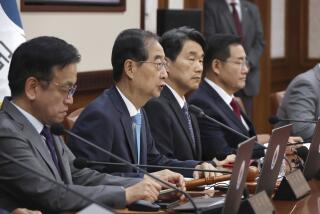Time to Rethink N. Korea Policy
- Share via
If ever there was a time for Washington to reappraise its policy toward North Korea, it is now. In the midst of meetings between American and North Korean negotiators in New York, the Pyongyang regime fired a new, longer-range missile across the Sea of Japan and over the Japanese mainland. That provocative act constitutes a major setback in diplomatic efforts to draw hostile North Korea into the world community.
The missile was discussed at Monday’s meeting in New York, which focused on implementation of a 1994 accord under which the United States, South Korea, Japan and the European Union would help North Korea build two nuclear power reactors of no military use in exchange for a freeze on nuclear weapons development. U.S. representatives did not say Monday what, if any, explanation was given by Pyongyang. On Tuesday, North Korea declined to meet.
The launch clearly demonstrated North Korea’s ability to strike at any major Japanese city. The second, final stage of the newly developed Taepodong 1 missile landed in the Pacific Ocean after flying over northern Japan. Tokyo’s condemnation was prompt, unequivocal and correct. It said it will suspend talks aimed at normalizing diplomatic relations, freeze aid for the nuclear power reactors and refuse requests for more food assistance from famine-ridden North Korea. Once again, ordinary North Koreans will pay for their government’s half-cocked behavior.
U.S. officials, curiously, said they were not surprised by the test and had warned of it in advance. Military analysts pointed to the range capability that North Korea has now shown and said that chemical, biological and even nuclear warheads could be put on such a missile. The test came only a few weeks after U.S. intelligence satellites uncovered activity at a huge, supposedly shuttered nuclear facility.
Perhaps Pyongyang fired the missile as a ploy to get Washington to fully deliver on its pledge to provide 500,000 tons of fuel oil this year as part of the reactor deal. If so, the tactic has backfired. Members of Congress who had balked at paying for the fuel now are irate.
North Korea may have also been advertising its missile to other renegade nations. Military sales are one of the few money-making ventures left for the impoverished country, which has been warning that it may have to restart its nuclear weapons program. The episode smacks of blackmail, not diplomacy. All the more reason for the Clinton administration to reconsider its long, patient persuasion of Pyongyang.
More to Read
Sign up for Essential California
The most important California stories and recommendations in your inbox every morning.
You may occasionally receive promotional content from the Los Angeles Times.










